




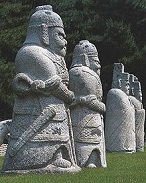


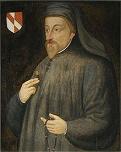


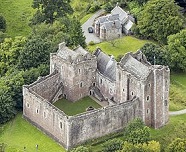
1400 Pop.: London: 50K, Cologne: 30K, Nuremburg: 20K, Lubeck: 20K. By this time voyaging contacts of Hawaii with CE Polynesia (Tahiti, Samoa, Tonga, Cook and Society Islands) end because of loss of some necessary resting atolls, after which pop. growth causes settlement expansion in the arid leeward zones and the upper dry-land forests, while social classes and tribes emerge. The last major plague outbreak in Europe occurs (1347, 1361, 1369, 1371, 1390). Agriculture in Europe begins to slowly recover from the effects of cents. of loss of arable land to floods, famine, plague, and war. Capitalism begins its rise in Europe in Venice, Flanders, and Florence - there's horns everywhere? On Feb. 15 deposed English king Richard II (b. 1367) is murdered while imprisoned in Pontefract Castle, ending the main Plantagenet line (founded 1154), although the cadet branches of Lancaster and York are still kicking (until 1485). In Apr. Byzantine emperor Manuel II begins a 3-year tour of Europe to drum up support, starting with Venice, then Padua, Vicenza, Pavia, and Milan, followed by Paris as a king of Charles VI, then London, where Henry IV is wowed by his regal splendor. On Aug. 21 after failing to show up to answer charges of failing to maintain the peace or resolve the Great (Western) Schism of 1378, good king Wenceslaus, er, not-so-good German king (since 1376), Bohemian king (1378-1419), and HRE (since 1378) Wenceslaus (Wenceslas) (Wenzel) IV (the Drunkard) (the Lazy) of Luxembourg (1361-1419) looks down and is deposed from the German throne by the electors, but never waives his title, and on Aug. 21 Rupert (Ruprecht) (Robert) III of the Palatinate (1352-1410) becomes German Wittelsbach king and uncrowned HRE (until May 18, 1410). In Aug. Henry IV invades Scotland to stop border raids; Scottish king (1390-1406) Robert III (1337-1406) doesn't concede defeat, and it becomes a stalemate. On Sept. 16 Welsh supporters of Richard II rebel against Henry IV in the Owen Glendower (Glyndwr) Revolt (ends 1412), with the rebels rapidly gaining control of large areas of Wales, only to find them difficult to defend sans artillery and ships; in Sept. Welsh gentleman Owen Glendower (1359-1416) is proclaimed prince of Wales, causing Henry IV to move his army into Wales in Oct., but he is outfought and there is another stalemate. On Nov. 28 after killing many rivals and relatives to gain power, Taejong (Yi Bang-won) (1367-1422), 5th son of Taejo becomes king #3 of the Chosun (Joseon) Dynasty (until Sept. 9, 1418), going on to become an effective ruler, promoting commerce, education, and printing, fighting off the Jurchens on the N border and Japanese pirates on the S coast, raising eyebrows with his passion for hunting. Henry IV is in radio hell out of the starting blocks? On Dec. 25 (Xmas) a group of English nobles (barons) backing Richard II hatch a revolt against Henry IV in Windsor, planning to assassinate him and his sons in their sleep at yuletide, but even though the assassins gain entrance to the castle, the intended victims escape, and the conspirators are defeated. The gang's all here? Robert III's son and heir David Stewart, 1st Duke of Rothesay (1378-1402) seizes customs revenue, and begins trying to remove officials loyal to his uncle Robert Stewart, Duke of Albany (1339-1420), turning the latter against him; Rothesay then hooks up with the daughter of the earl of Douglas, causing the earl of March to call in Henry IV of England, who marches to Edinburgh with an army making vague claims to the Scottish throne, then leaves, giving Albany an excuse to begin circulating stories about Rothesay being a power-mad degenerate lecher and Hun. Duke Gian Galeazzo Visconti of Milan takes Assisi, Perugia, and Lucca, spends 300K golden florins to keep the Mincio family from taking Mantua and the Brenta family from taking Padua, and goes after the remaining big jewels of Bologna and Florence - how many lucky numbers separate you from millions? Fresh from the Delhi after a stop in Samarkand to store his loot, Sunni Muslim Mongol conqueror Tamerlane (Timur-i-Lang) (Temur the Lame) (1336-1405) heads toward Egypt on his last great conquest, restoring control of Azerbaijan, then invading Syria and sacking Aleppo. Henry III of Castile sends a fleet that destroys the pirate base of Tetouan (Tétouan) in North Africa (modern-day Morocco). Ho Quy Ly (1336-1407) ends two decades of strife and wars in Vietnam, seizing the throne, although he is not widely accepted. The Nilotic Maasai people migrate S from the lower Nile River valley N of Lake Turkanasa to a long trunk of land stretching from modern-day N Kenya to C Tanzania by the 17th-18th centuries, covering almost the entire Great Rift Valley from Nount Marsabit S to Dodoma, becoming the southernmost Nilotic speakers, living by cattle-raising and becoming known for their throwing clubs (orinka), accurate 100m (70 paces). About this time the Nguni people (Ndebele, Swazi, Xhosa, Zulu tribes) known for their large herds of Nguni cattle, male-dominated clans, and click languages picked up from San hunters migrate S from Sotho-Tswana and Tsonga to the Great Lakes region of C/SE Africa. Early in the cent. a rebellious Bosnian chieftain seizes the Hum region of Bosnia and establishes it as the independent duchy of Herzegovina ("independent duchy"), the name first officially used by the Ottomans in 1454; the capital is Mostar (until 1466). Malay Hindu prince Parameswara (Sansk. "supreme voice") (1344-1414) of Temasek (Singapore) is expelled by pirates from Majapahit, going on to found the Muslim trading kingdom of Melaka (Malacca) on the Malay Peninsula by 1402, and converting to Islam under the name Iskandar Shah, greeting Chinese adm. Cheng Ho in 1409. In this cent. Muslim trading states are established in Luzon and the S Philippines. In this cent. Burgos becomes the commercial center of Castile. In this cent. the Maasai migrate from the lower Nile Valley N of Lake Turkana to Kenya and Tanzania. In this cent. the Am. Great Plains, sparsely inhabited for cents. because of severe drought begin to become inhabited again as the climate begins to return to normal. There are 55 breweries and 86 malt houses in Bohemia. The Egyptians and Persians largely give up brewing of spirits under Muslim influence - except for stomach ulcers? About this time Renaissance Humanism gets off to a fast start, reviving classical learning and speculative inquiry, displacing Scholasticism as W Europe's main philosophy, and taking the monopoly of learning from churchmen, letting laymen into the equation, which soon causes the very basis of Church dogma and tradition to come under the microscope; too bad, by the middle of the cent. the pendulum swings, bringing Witch Mania, which causes thousands of mostly women to be executed until the late 17th cent. In this cent. Evora (Évora) (ancient Ebora) 68 mi. SE of Lisbon becomes the residence of the Portuguese court (until the 17th cent.). The Middle and Upper Mississippi Phases of mound bldg. in North Am. begin. In this cent. Rangitoto Volcano in New Zealand (near modern-day Auckland) is born, destroying a nearby Maori village. Wolves are still attacking Parisians well into this cent.? The Burgundian Era in Western Music begins (ends 1474). The Early Renaissance Period of Art begins (ends 1500). About this time in in Europe high class men and women begin wearing elaborate coiffures, and men curl their beards and form them into living statuary with gum and other goop; English women begin to let their hair hang down the back in curls, although some keep it in a caul or turban - talkin' about my girl? In this cent. a law is passed in Venice requiring gondolas to be painted black - ask Mick Jagger? In this cent. ecclesiastical drama flourishes in Italy. In this cent. the earliest known lit. in the Cornish tongue is written. About this time the English word "akimbo" is coined. In this cent. the Grim Reaper is first mentioned in England. In this cent. the Great Vowel Shift begins (ends 1750), changing the vowel system of Middle English into that of Modern English; long high vowels change to diphthongs, and long mid and low vowels are raised in their tongue positions. In this cent. the English letters U and V (heretofore used interchangeably) begin to diverge, with U becoming the cursive form. The Medieval (Low) Period of Latin (begun 535) ends, and the New (Modern) Latin Period begins, with Renaissance writers returning to classical Ciceronian Latin, making it the internat. language of science, religion, philosophy, lit., and diplomacy (until 1700); after 1700 it is used only by classical scholars and Roman Catholics. The term Hortus conclusus (Lat. "enclosed garden") suddenly appears in poetry and art as a title of the Virgin Mary, taken from Song of Solomon 4:12. The Hope Diamond is mined late in this cent. from the Kistna River in SW India, put in the forehead of an Indian temple idol, then stolen by a Hindu priest, who is caught and tortured to death; by the time it ends up in the Smithsonian in the 20th cent., at least 20 die because of it. In this cent. the Hungarians form the Hussars, a light cavalry named after the Corsairs. In this cent. alchemy becomes the field of choice for swindlers and golddiggers. In this cent. Plough Monday (first Mon. after Twelfth Day or Epiphany) is first mentioned as the start of the English agricultural year, complete with celebrations featuring a plough hauled from house to house in a procession collecting money accompanied by musicians, an old woman called Bessy, and a Fool. Sports: In this cent. the game of Billiards (Fr. "billart" = wooden stick") is first played in N Europe after evolving from a lawn game, hence the wooden table with green cloth; it takes until the end of the 17th cent. to develop a cue stick by turning the big-headed mace backwards? In this cent. card games become popular throughout Europe. Architecture: In this cent. Ballyhack ("Gael. "townland of the stable") Castle in Waterford Harbor in County Wexford, Leinster, Ireland is built by the Normans (Knights Hospitalers?). The Sedlec Church of All Saints in Kutna Hora, Czech. is built on the site of a graveyard where Ottokar II of Bohemia sprinkled dirt from Golgotha in 1278, and it is decorated with bones from the cemetery, bursting with skeletons from the Black Death. Doune CAstle in Stirling, C Scotland 8 mi. NW of Stirling at the confluence of the Teth and Forth Rivers is built by Robert Stewart, Duke of Albany (1340-1420) on lands granted him when he was created earl of Menteith, with a charter sealed in 1381. The Incas begin putting stone-walled terraces (andenes) in the steep slopes of the Andes. Early in this cent. the Church of St. Peter and Church of the Holy Ghost are built in Heidelberg, Germany, capital of the Palatinate, which becomes one of the main strongholds of German Protestantism. Inventions: In this cent. windmills in Europe begin to be used for tasks other than grinding grain, incl. land dranage. In this cent. the baker's mark begins to be used in Europe. In this cent. the Dulcimer is first mentioned. In this cent. Italy and Britain begin issuing the world's first Patents. In this cent. Knitting is allegedly invented in Scotland - eat my kilt? Nonfiction: About this time Medulla Grammatica, a glossary of difficult Latin terms with Anglo-Saxon explanations is pub. In this cent. the grimoire (magician's handbook) Munich Manual of Demonic Magic is written. The oldest surviving copies of Thirteen Treasures of Britain and The Twenty-Four Knights of King Arthur's Court date to about this time. Music: The popular Danish ballad By the Turret Stair is composed: "Run, run, little page, tell your lady fair/ That her lover waits by the turret stair". In this cent. secular Jewish Klezmer music is developed for weddings and celebrations, with lyrics in Yiddish. Plays: This is the English cent. of the morality play, usually anon.; early in the cent. the morality play Castle of Perseverance (1440) is produced; later Hyckescorner is produced, followed late in the cent. by Mankind; the #1 hit is Everyman (1510) (taken from a Dutch source), about Everyman journeying to the Valley of Death and losing all his Material Riches but becoming content with Good Deeds. Births: Spanish bishop of Avila (1449-) Alonso Tostado (Toswtatus Abulensis) (d. 1455); educated at the U. of Salamanca; known as the wonder of the world for his great memory and vast knowledge, causing the phrase "to know more than Tostado" to be coined. Dutch Burgundian (Franco-Flemish) composer Gilles Binchois (de Binche) (de Bins) (d. 1460). English Yorkist leader (chancellor in 1454-9) Richard Neville, 5th Earl of Salisbury, 7th and 4th Baron Montacute (d. 1460) in Raby Castle, Durham; 3rd son of Ralph Neville, 1st Earl of Westmoreland (1364-1425) and 2nd wife Joan Beaufort (1379-1440); husband (1425-) of Alice Montagu (1407-), daughter of Thomas de Montacute, 4th earl of Salisbury (1388-1428); father of Richard Neville, 6th earl of Salisbury and 15th earl of Warwick (1428-71), and George Neville (1432-76). Spanish Franciscan missionary (Canary Islands) (St.) Didacus of Alcala (Alcalá) (Diego de San Nicolas) (d. 1463) in San Nicolas del Puerto, Seville; feast day: Nov. 7/13. Greek Byzantine historian Doukas (Dukas) (Lat. "dux" = leader) (d. 1463). German printer Johann Fust (d. 1466). Italian (Venetian) painter Jacopo (Iacopo) Bellini (d. 1470) in Venice; father of Gentile Bellini (1427-1507) and Giovanni Bellini (1428-1516). Hindu sage Ramananda (d. 1470). Greek ecumenical patriarch of Constantinople (1454-64) Gennadius II Scholarius (d. 1473) in Constantinople; big fan of Aristotle, and enemy of Plato fan Gemistus Pletho. Ottoman historian Ashikpashazade (Ashik Pasha-Zade) ("son of Ashik Pasha") (d. 1484) in Amasya; great-grandson of mystic poet dervish Ashiq Pasha (1272-1333). Deaths: Scottish nobleman Archibald "Black Douglas, 3rd earl of Douglas (b. 1328) in Threave Castle. Chinese novelist Luo Guanzhong (b. 1330); leaves Romance of the Three Kingdoms (800K words, 120 chapters), set in the Three Kingdoms (Cao Wei, Shu Han, Eastern Wu) era of 169-280 C.E., covering 1K dramatic chars, becoming the Shakespeare of Chinese lit.; also leaves (with Shi Naian) Outlaws of the Marsh (Water Margin), becoming the first two of the Four Great Classical Novels of China along with "Journey to the West" and "Dream of the Red Chamber". French chronicler-traveler Jean Froissart (b. 1337); leaves Froissart's Chroniques (Chronique de France, d'Angleterre, d'Ecosse et d'Espagne) (Chronicles of France, England, Scotland and Spain) (1.5M words), covering from the deposition of Edward II in 1326 to 1400, becoming the chief description of the chivalric culture of 14th cent. England-France and the Hundred Years' War; incl. personal accounts of the 1367 baptism of Richard II in Bordeaux, the 1380 coronation of Charles V in Rheims, the 1386 preparations for the invasion of England in Sluys, the 1389 marriage of Duke John of Berry and Jeanne of Boulogue in Riom, and the 1389 joyous entry of French Queen Isabeau of Bavaria to Paris; too bad, they are filled with errors; he has "marvelous little sympathy" for the "villain churls" (Sir Walter Scott); first known mention of the verge escapement for clocks. English "Poet of the Dawn", "Father of English Poetry" Geoffrey Chaucer (b. 1343) on Oct. 25 in London (murdered by Archbishop Thomas Arundel's men?); first lit. figure buried in Westminster Abbey, where he lived in some apts., and the first in Poet's Corner; leaves the unfinished Rime of Sir Thopas, a burlesque ridiculing medieval romances, and his magnum opus The Canterbury Tales (17K lines, 40K words), making Midland English respectable after recasting the former Anglo-Saxon dog vocabulary with Continental touches and creating English versification; contains only 24 of 120 planned short stories from an ensemble of 30 characters (two each on the way to Canterbury from London, two on the way back, with the winner to get a free supper): the Knight, the Nun's Priest, the Pardoner, the Wife of Bath (5 husbands), the Nun, Lawyer, Student, Cook, Merchant, Squire, Physician, and Chaucer himself; "The rotten apple injures its neighbors"; "Whan that Aprille with his shoures soote/ The droghte of Marche hath perced to the roote,/ And bathed every veyne in swich licour"; coins the term "mind's eye" in The Man of Law's Tale. English royal mistress (of Edward III) Alice Perrers (b. 1348). English king (1377-99) (deposed) Richard II (b. 1367) on Feb. 15 in Pontefract Castle (murdered); the last Plantagenet king (ruled since 1154); a hole is left in his tomb so that people could touch his royal head, and in 1776 somebody steals his jawbone?

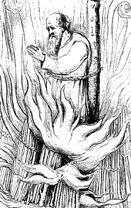


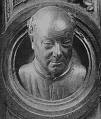

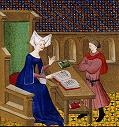
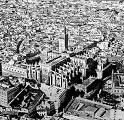
1401 Henry IV gives his 13-y.-o. son Prince Henry (b. 1387) the dirty job of defeating Owen Glendower in North Wales; Sir Henry "Harry "Hotspur" Percy (1364-1403), son of Sir Henry "Hotspur" Percy, 1st earl of Northumberland (1341-1408) (descendant of Henry III) is assigned as his guardian, but he resigns in June after getting pissed-off about not being paid. So you're a tick? Light the wick? Early in the year to bolster his hold on the throne, English king (since Sept. 30, 1399) Henry IV (1367-1413) sides with the bishops' persecution of the Lollards, beginning with the no-shades-of-grey act of Parliament titled De Haeretico Comburendo ("On the Burning of the Heretic"), providing for the burning of heretics (them), starting with Norfolk priest Sir William Sawtrey, who is carbureted on the herestick in Mar.; "Divers false and perverse people of a certain new sect...they make and write books, they do wickedly instruct and inform people... and commit subversion of the said catholic faith"; "That this wicked sect, preachings, doctrines, and opinions, should from henceforth cease and be utterly destroyed..."; "That all and singular having such books or any writings of such wicked doctrine and opinions, shall really with effect deliver or cause to be delivered all such books and writings to the diocesan of the same place within forty days from the time of the proclamation of this ordinance and statute... And if any person... such books in the form aforesaid do not deliver, then the diocesan of the same place in his diocese such person or persons in this behalf defamed or evidently suspected and every of them may by the authority of the said ordinance and statute cause to be arrested" and "be burnt, that such punishment may strike fear into the minds of others..."; repealed in 1559 and Mar. 1677. One Muslim keeps another Muslim from finally taking the thousand-year Christian stronghold of Constantinople, I guess Allah is schizo? Just as Beyazid I is about to take Constantinople, which is defended by foreign troops under Hungarian king (since 1387) Sigismund I (1368-1437), Tamerlane sacks and burns Damascus after exacting a large tribute from its residents, then slaughters most of them, causing Beyazid to end the siege early next year to defend his country; after deporting thousands of artisans and religious scholars to Samarkand, leaving the Syrian economy in the timid lane, he sacks Baghdad. Duke Gian Galeazzo Visconti of Milan routs Elector Rupert III, who is in the pay of the Florentines, then closes in for the final kill on Florence. Witowt (Witold) (Vytautas) the Great (1350-1430) is finally recognized by Ladislaus II of Poland as grand duke of Lithuania (until 1430) under his suzerainty. Malwa in India proclaims independence. Scottish queen Annabella Drummond (b. 1350) dies at Scone, giving Duke Robert Stewart of Albany an opening to get his nephew and enemy Duke David Stewart of Rothesay arrested by his own household retainers at St. Andrews and removed from office right before his commission as lt. of Scotland is due to expire early next year; he then gets him chained in the dungeon of his Falkland Palace and starved to death. Speaking of smelling the roses, Italian brain babe Christine de Pizan (1363-1434) gets in a 2-year debate on the lit. merits of Jean de Meun's The Romance of the Rose, starting by dissing him for depicting women as foul-mouthed sluts and ending up dissing all unjust slander of women in lit. texts, making her into a Euro champ of feminism in a chastity belt world. Lorenzo Ghiberti (1378-1455) wins an art competition in Florence to build the first set of bronze doors for the baptistery of the Florence Cathedral (scenes from the New Testament), with Brunelleschi coming in #2, making him a big man, setting up a large workshop that goes on to train Donatello (1386-1466), Masolino (1383-1447), Michelozzo (1391-1472), Paolo Uccello (1397-1475), and Antonio Pollaiuolo (1429-98), and rediscovers the ancient Roman lost-wax casting (cire perdue) technique. Architecture: The Gothic Seville Cathedral, largest in Spain is begun (consecrated in 1507, finished in 1528), passing Hagia Sophia as the world's largest cathedral, also the world's largest Gothic church and world's largest cathedral. Births: Japanese emperor #101 (1412-28) Shoko (Mihito) (d. 1428) on May 12; eldest son of Go-Komatsu (1377-1433); name comes from Shotoku (#48) + Konin (#49). English "Kiss Me Kate" queen consort (1420-2) Catherine of Valois (d. 1437) on Oct. 27 in Paris; daughter of Charles VI of France and Isabella of Bavaria-Ingolstadt; wife (1420-2) of Henry V. Italian duke of Milan (1450-66) Francesco I Sforza (d. 1466) on July 23 in San Miniato, Tuscany; illegitimate son of Count Giacomuzzo Sforza (1369-1424) and Lucia da Torsano; brother of Alessandro Sforza (1409-73); husband (1441-) of Bianca Maria Visconti (1425-68); father of Galeazzo Maria Sforza (1444-76) and Lodovico Sforza (1451-1508). Italian artist Masaccio (Ital. "Sloppy Tom") (d. 1428); first artist to apply the laws of perspective - however sloppily? Bavarian frustrated countess Jacqueline of Hainaut (d. 1436); daughter of William II and Margaret of Burgundy (daughter of Duke Philip the Bold); wife (1422-) of duke Humprhrey of Gloucester (1390-1447). French duke of Bourbon (1434-56) Charles I (d. 1456); husband (1425-) of Agnes of Burgundy (1407-76) (daughter of John the Fearless); father of John II (1426-88). German #1 philosopher-astronomer-mathematician and cardinal (1448-) Nicholas of Cusa (Cusanus) (Kues) (Johann Krebs) (Hannan Cribtz) (d. 1464) in Kues; educated at the U. of Padua; junks Aristotle and his static limited cosmos in favor of Democritus and Lucretius, and lays the intellectual foundation for Copernicanism and Calculus, claiming that the Universe is infinite and has no center, and that Earth is just another star, with no celestial body or orbit being perfect (circular or spherical), developing the concepts of relative motion and the infinitesimal; invents eyeglasses with concave lenses to correct myopia. Deaths: Islamic legal scholar Muhammad ibn Arafa al-Warghami (b. 1316) in Tunis; revived the Maliki school of Islamic law. Scottish explorer Henry Sinclair, earl of Orkney (b. 1345). Scottish queen Annabella Drummond at Scone; buried in Dunfermline. Norse pirate Klaus Stortebeker (b. ?) in Hamburg (executed).

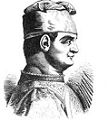

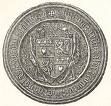


1402 The plague hits Iceland, killing half its pop. On Mar. 26 David Stewart, 1st duke of Rothesay (b. 1378), heir to the Scottish throne since 1390 starves to death in the duke of Albany's dungeon in Falkland Castle, and after Albany gets the support of Archibald, 4th earl of Douglas (justiciar of Scotland S of the Forth River), his daddy, aged infirm king Robert III signs an official statement that his son died "by divine providence and not otherwise", and that all murmuring against Albany and Douglas must cease; Albany is appointed the king's lt. for two years, and approves Douglas' demand for war with the stankin' English. On June 26 wannabe Lombard king Duke Gian Galeazzo Visconti (b. 1351) defeats Bologna at the Battle of Casalecchio, then comes down with the plague and dies on Sept. 3 while sieging his big dream Florence, saving it from Visconti control while leaving a top collection of stolen mss. from his conquests; his cruel 13-y.-o. son Giovanni (Gian) Maria Visconti (1388-1412) (known for keeping dogs trained to kill and eat men) becomes duke #2 of Milan (until May 16 1412), while his 10-y.-o. brother Filippo Maria Visconti (1392-1447) waits in the wings; Galeazzo's generals now split up his duchy, bringing a period of anarchy, and undoing all of Galeazzo's work; meanwhile, just when it looks like Italy is going Visconti, the Medici Family begins its dazzling ascent in Flor Flor Florence, as self-made man Giovanni di Bicci de' Medici (1360-1429) begins plotting to put his man into the papal chair, and by 1737 four Medicis have made it. On July 20 Tamerlane defeats the Ottomans at the Battle of Ankara (Angora) at the Cubuk Field and captures Beyazid I and his son Musa, exhibiting Beyazid in a cage; the growth of the Ottoman Empire is temporarily halted, and it nearly collapses (lucky that Lame Tim only has a few years left?); happy Byzantine emperor Manuel II Palaeologus, who just toured Europe trying to get help in vain now enjoys 20 years of peace by playing the Turks off against the Mongols; in Dec. after virtually destroying Sardis, Tamerlane captures Smyrna from the Knights of Rhodes (held since 1344) after which the sultan of Egypt sends an offer of submission. On Aug. 15 Henry III of Castile and John I of Portugal sign a peace treaty. On Sept. 14 English hotshot Sir Henry "Harry Hotspur" Percy (1364-1403), in command of the Welsh border wins a humbling V over the Scots at the Battle of Homildon (Humbleton) Hill in Northumberland W of the town of Wooler, revenging Otterburn, and capturing Scottish leader Archibald, 4th Earl of Douglas (1372-1424), and Murdoch (Murdac) Stewart, 2nd Duke of Albany (1362-1425), son and heir of Robert Stewart, duke of Albany; a bitter quarrel begins between Hotspur and Henry IV when Hotspur refuses to turn Douglas over except in exchange for the ransom of his brother-in-law (nephew of his wife) (would-be king) Edmund de Mortimer, 5th earl of March, who had been captured by the Welsh rebel Owen Glendower; this causes Sir Edmund Mortimer, uncle of the 5th earl of March to turn against Henry IV and enter into an alliance with Glendower, marrying his daughter; meanwhile the duke of Albany gets Robert III stripped of the earldom of Atholl, and gives it to his half-brother Walter Stewart (1360-1437), but the old fart king still has some spunk, and he begins to promote his last remaining son and heir James Stewart, making him earl of Carrick with a special jurisdiction that Albany and Douglas can't touch. Wenceslaus IV is imprisoned and temporarily deposed by his younger brother Sigismund I with the support of the Czech nobility (until 1403). French adventurers Jean de Bethencourt (Béthencourt) (1362-1425) and Gadifer de la Salle (1340-1415) in the name of Henry III of Castile and Leon begin conquering the Canary Islands, which were awarded to them by papal bull by 1344 but claimed and held by Portugal, starting with Lanzarote, followed by Fuerteventura Island in 1405 and El Hierro, with Bethencourt taking the title of king while recognizing Henry III as his overlord; the pissed-off Portuguese will be back in 1425. Malik Sarvar dies, and Ibrahim Shah (-1436) becomes ruler of Jaunpur, going on to become a liberal patron of learning. The False Olaf appears in the Polish village of Grudziadz, claiming to be the late Danish king (1376-87) Olaf II, fooling the townsmen, who give him expensive clothes, make him a seal, and help him write a letter to Queen Margaret, who bites and invites him to Kalmer, escorted by the grandmaster of the Teutonic Knights; too bad, he can't speak Danish, and admits to be a Prussian peasant from Eger, after which he taken to Lund in Scania and burned, after which the Danish nat. council releases a letter affirming the real Olaf's death in 1387. Architecture: Brussels Town Hall in modern-day Belgium is begun. Nonfiction: Pier Paolo Vergerio the Elder (1370-1445), On Good Manners; the first Euro treatise about the proper education of princes? Births: Mexican philosopher-inventor king of Texcoco Nezahualcoyotl ("Coyote Who Fasts") (d. 1472) on Apr. 28; son of Ixtlilxochitli I and Matalcihuatzin (daughter of Huitzilihuitl). English soldier Humphrey Stafford, 1st Duke of Buckingham (d. 1460) on Aug. 15; son of Edmund, 5th earl of Stafford and Anne (daughter of Duke Thomas of Gloucester, son of Edward III); father of Henry Stafford, 2nd duke of Buckingham (1454-83). Deaths: Bulgarian monk Euthymius of Turnovo (b. 1317). Bulgqrian patriarch (1375-93) St. Euthymius of Tarnovo (b. 1325) in Bachkovo Monastery. English duke Edmund of Langley (b. 1341). Italian duke #1 of Milan (1395-1402) Gian Galeazzo Visconti (b. 1351) on Sept. 3 in Castello Melegnano, Pavia (plague). Scottish royal heir David Stewart, 1st duke of Rothesay (b. 1378) on Mar. 26 (starved to death in the dungeon of Falkland Castle).

1403 On Mar. 8 caged sultan (since 1389) Beyazid I the Thunderbolt (b. 1360) commits suicide in Askehir, Turkey, and the Ottoman Interregnum (Triumvirate) begins (ends 1413), as three of his six sons recognize Tamerlane's suzerainty and are installed as local rulers: Suleyman Celebi ("gentleman") (-1419) (eldest son) in N Greece, Bulgaria and Thrace (capital Edirne), Mehmed I Celebi (1389-1421) in Amasya (capital Bursa), and Isa Celebi in Greece and W Anatolia (until 1404); meanwhile remaining sons Musa Celebi (-1413), Kasim, and Mustafa (-1401) are waiting in the wings; after Tamerlane dies in 1405, the brothers begin a battle for sole control of the Ottoman Empire (winner: Mehmed I). On May 21 Henry III of Castile sends ambassadors to Tamerlane (Timur) to discuss a possible alliance against the Ottoman Empire. On July 19 after marrying Mary of Lusignan, daughter of the king of Cyprus in 1401, crowning himself duke of Slavonia, and negotiating a treaty with Venice ceding the island of Corfu in exchange for free passage in the Adriatic Sea, Ladislaus (Lancelot) the Magnanimous of Naples (1377-1414), son of prior Hungarian king Charles II (Charles II of Naples) and Margaret of Durazzo lands in Zadar with the support of Pope Boniface IX with the intention of obtaining the crown of Hungary, but chickens out and returns to Apulia, retaining authority in Zadar; meanwhile he orders the painting of a cycle of the St. Ladislaus legend in the Church of Santa Maria dell'Incoronata in Naples (built in 1352-73) to boost the St. Ladislaus cult (finished 1414). On July 21 after Henry Percy, 1st earl of Northumberland, along with Thomas Percy, 1st Earl of Worcester (1344-1403), and Sir Edmund (de) Mortimer (1376-1409), youngest son of Edmund de Mortimer, 3rd earl of March (great-grandson of Edward III) plot to dethrone Henry IV and put Edmund (de) Mortimer, 5th earl of March (1391-1425) on the throne, and Henry IV anticipates the move, rushing an army assembling for a Scottish campaign west and intercepting Hotspur before he can join Glendower, the close Battle of Shrewsbury in Shrewbury, Shropshire sees his 16-y.-o. son Prince Henry (later Henry V) lead the royal army against the rebellious Percy family and decisively defeat them; Hotspur (b. 1364) is KIA; Worcester is beheaded, but Northumberland, who took no part in the battle is deprived of some of his power and pardoned. In Sept. Lord John of Liechtenstein leads a party of knights that frees Wenceslaus IV from prison in Vienna and gives him refuge in his castle in Moravia near Mikulov. Qara Yuluk Uthman (1389-1435) becomes ruler of the Aq-Qoyunlu (White Sheep) Turkoman confederation based in Diyarbakr (Diyar Bakr) in SE Anatolia on the Tigris River, which later takes advantage of the death of Tamerlane to take the cities of Erzurum and Mardin, giving them control of important trade routes - pay the white sheep or else? Martin I of Aragon rescues Avignon pope Benedict XIII from imprisonment and shelters him in Valencia. Henry IV of England issues an order exempting fishing vessels from prize capture in times of war, signing a treaty with France making it internat. law; in 1521 HRE Charles V and Francis I of France sign a similar treaty. The Doge of Venice imposes a quarantine of 40 days as a safeguard against the plague. Emperor (since 1398) Jianwen (Ming Hui Di) is overthrown by his uncle Yung-lo (Yongle), who becomes Ming emperor #3 Ming Chen Zu (Ch'eng Tsu) (-1424) (until 1424), going on to build the Purple Imperial City on the holy mountain of Wu Dang (Wu-Tang) in NW Hubei Province; sections of the Great Wall of China are rebuilt using sticky rice mixed into slaked lime to make it last longer. Architecture: Lorenzo Ghiberti begins work on the Porches of the Florence Baptistery. The Prater (Lat. "pratum" = meadow) park in Vienna is first mentioned, owned by the HRE and used as a hunting ground from 1560, then opened to the public by HRE Joseph II in 1766. Nonfiction: The Yung Lo Ta Tien (Yongluo Dadien) 22,937-vol. encyclopedia begins compilation; only three copies are made. Births: Greek scholar-monk (metropolitan of Nicaea) (Greek-to-Roman Catholic convert) Johannes (Basilius) (Basilios) Bessarion (d. 1472) on Jan. 2 in Trebizond; student of Gemistus Pletho. French Valois king (1422-61) (crowned 1429) (Joan of Arc's fantasy man?) Charles VII (the Victorious) (the Well-Served) (d. 1461) on Feb. 22 in Paris; 5th son of Charles VI (1368-1422) and Isabelle of Bavaria-Ingolstadt (1371-1435); brother of Catherine of Valois (1401-37), wife of Henry V and mother of Henry VI (1421-71); father (by wife Marie of Anjou) of Charlotte of Savoy (1443-83), wife of Louis XI and mother of Anne of Brittany (1477-1514), wife of HRE Maximilian I, Charles VIII and Louis XII. Ottoman sultan #5 (1421-44, 1446-51) Murad II (d. 1451) in June in Amasya; son of Muhammad I the Restorer (1389-1421); father of Mehmed II (1432-81). English soldier John Beaufort, 1st Duke of Somerset (d. 1444); son of John Beaufort, 1st earl of Somerset (1373-1410), eldest son of John of Gaunt; brother of Edmund Beaufort, 2nd duke of Somerset (1406-55). Deaths: Ottoman sultan #4 (1389-1402) Bayezid I (b. 1360) on Mar. 8 in Askehir, Turkey (suicide). Portuguese author Vasco de Lobeira (b. 1360). English rebel Harry Hotspur (Sir Henry Percy) (b. 1364) (KIA).


1404 On Apr. 27 Philip the Bold (b. 1342) dies, and his able son John I the Fearless (Jean sans Peur) (1371-1419) (who earned his nickname at the 1396 Battle of Nicopolis) becomes duke of Burgundy (until Sept. 10, 1419), continuing father's feud with Duke Louis of Orleans (d. 1407), the dissolute younger brother of increasingly mad Charles VI, who is married to Valentina Visconti of Milan, with both of them attempting to play millionaire and fill the power vaccum; soon after inheriting his title he introdues and/or legalizes hops in the county of Flanders, causing them to ditch gruit, and founds the Order of the Hop. In July Charles VI concludes an alliance with Owen Glendower, recognizing him as the prince of Wales. On Oct. 1 Pope (since 1389) Boniface IX dies, and on Oct. 17 Cosimo de'Migliorati is elected yet-another-old-Italian-guy Pope (#203) Innocent VII (1336-1406); on Oct. 19 Ladislaus the Magnanimous of Naples intervenes in Rome in support of the Colonna family, murdering several members of the Sanseverino family before leaving, then returning next year, accepting the lordship of Rome from some nobles, which pisses-off the pope. In Dec. after returning to Samarkand and preparing for an expedition to China, Tamerlane leaves, directing it from a litter as he lays dying? The English Commons demands that Church property be confiscated and applied to poor relief, but Henry IV opposes them, risking the loss of his Parliamentary support (who hired him?) to get Church backing and develop another leg to stand on? The English Parliament, fearing that alchemists could bring ruin upon the state pass a law declaring the making of gold or silver by alchemy to be a felony - is fool's gold a defense? The U. of Turin is founded when the Lombardy wars interrupt the lectures of some professors and they decide to move somewhere more quiet? Henry Paye is granted a letter of marque by English king Henry IV. The term "brioche" (Fr. "broye" = wooden roller) is first mentioned in France (Normandy?), enriched pain benit (blessed bread). Architecture: Work begins on the N and S cloisters of the Worcester Cathedral in England (ends 1432). Plays: Mao-Tseu, Pi Pa Ki (Story of the Lute). Births: Byzantine emperor (last) Constantine (Konstantinos) XI Dragases Palaeologus (Paleologos) (d. 1453) on Feb. 8 in Constantinople; 8th of 10 children of Manuel II and Helen Dragas, daughter of Serbian prince Dragas of Kumanov; likes to use his mother's name Draga. Italian Renaissance humanist polymath painter, art theorist, and architect (pioneer in perspective) (precursor to Leonardo da Vinci) Leon Battista Alberti (d. 1472) on Feb. 14 in Genoa; student of Gasparinus de Bergamo (1360-1431). French queen consort (1422-63) Marie of Anjou (d. 1463) on Oct. 14 in Abbaye de Chateliers-en-Poitou; daughterof Louis II of Anjou (1377-1417) and Yolande of Aragon (1384-1442) (daughter of John I of Aragon); wife (1422-63) of Charles VII (1403-61) (who prefers to hook up with Agnes Sorel); mother of Louis XI (1423-83). Scottish queen consort (1424-37) Joan Beaufort (d. 1445); daughter of John Beaufort, 1st earl of Somerset (1373-1410) (illegitimate son of John of Gaunt) and Margaret Holland (1385-1439) (daughter of Thomas Holland, son of Joan the Fair Maid of Kent, the granddaughter of Edward I and mother of Richard II). English cardinal (1473-) and archbishop of Canterbury (1454-86) Thomas Bourchier (d. 1486); non-eldest son of William Bourchier, count of Eu (-1420) and Anne of Gloucester (1383-1438) (daughter of Thomas of Woodstock, a descendant of Edward III); educated at Oxford U. Deaths: English bishop William of Wykeham (b. 1320) on Sept. 27. French duke of Burgundy (1363-1404) Philip II the Bold (b. 1342) on Apr. 27 in Halle; the Tomb of Philip II the Bold is sculpted by Claus Sluter and his nephew Claus de Werwe, with help from Jean de Marville. Sardinian judge Eleanor of Arborea (b. 1347) in Oristano; namesake of Eleanora's falcon.





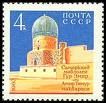


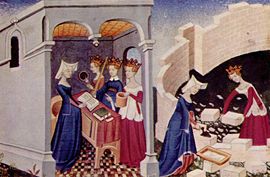
1405 You can conquer, but you can't rule, you lame SOB? On Feb. 18 Tamerlane (b. 1336) dies suddenly in Otrar on the Syr Darya (Jaxartes) River W of Chimkent, 250 mi. N of Samarkand, and is buried at Samarkand in the Gur-e Amir (Tomb of the King); he dies after conquering 2.145M sq. mi. (most in history?) of the Near East, from the Indus River to the Mediterranean Sea, and from the Indian Ocean N to the Aral Sea, killing 17M (5% of world pop.), but leaves no institutional arrangements to keep his empire intact, and lacks the legitimacy of descent from Genghis Khan; the Chinese and Ottomans are saved, and Damascus is soon rebuilt; Shah Rukh (Rokh) (1377-1447) (named after the chess move "check" being made by his daddy when given news of his birth) succeeds him as ruler (until 1447) of the Timurid Mongol Dynasty in Persia and Transoxiana (ends 1506), which begins disintegrating, losing W Iran, Iraq, and E Anatolia to the Aq-Qoyunlu (White Sheep Turks) and Qara-Qoyunlu (Black Sheep Turks), while keeping control of E Iran and Transoxania, and moving the capital from Samarkand to Herat in NW Afghanistan, where he and his wife Jawhar Shad become patrons of the arts, erecting magnificent bdgs. in Herat and Mashhad adorned with exquisite mosaic tilework, and encouraging painting and calligraphy as the empire goes to pot with the Seljuk iqta' system replaced by the suyurghal system, giving too much power to princes. On May 29 after French troops land in Wales to support Owen Glendower, archbishop of York (since Feb.-Mar. 1398) Richard le Scrope (b. 1350) breaks with Henry IV, and Henry Percy, earl of Northumberland raises the northern counties in revolt, the Battle of Shipton Moor near York sees Henry IV's warden of the marshes Ralph Neville, 4th Baron Neville de Raby, 1st Earl of Westmorland (1364-1425) (husband of Henry IV's half-sister Joan Beaufort, daughter of John of Gaunt) defeat the rebels, causing Percy to flee to Scotland, after which the tide turns in Henry IV's favor; on June 8 Scrope is executed in York for his participation in the Northern Rising. On Nov. 17 the Sunni Muslim Sultanate of Sulu is founded in the Sulu Archipelago of Malaysia by Johore-born Sharif ul-Hashim; in 1578 it gains independence from Brunei, going on to expand from W Mindanao to Palawan and the NE side of Borneo to Tepian Durian (modern-day Kalimantari); in 1851 it becomes a protectorate of Spain; in 1903 it becomes a protectorate of the U.S.; in 1915 the sultanate is officially abolished in a treaty with the U.S.; in 1974 Mohammad Mahakuttah Kiram (-1986) becomes the last officially recognized (by Ferdinand Marcosw) sultan of Sulu. Florence buys Pisa to gain direct access to the sea and along with its preeminence in belles arts begins its rise to prominence - the original pisa to go? The Ottomans invade Armenia. Hushang Shah (-1435) becomes Ghuri ruler of Malwa, and fortifies his capital at Mandu above the Narbada River, building the Hindola Mahal, AKA the Swinging Palace (known for sloping sidewalks to accommodate elephants), along with a great mosque. The pesky Mongols out of his hair, Chinese Emperor Yung-lo commissions the Seven Voyages of Cheng Ho in the Indian Ocean (ends 1433) in 317 technologically advanced ships with 37K crew in order to impress neighbors, bring states into vassalage, and get treasure and trade goods (dwarfing anything the Euros can match for the next two cents.), all headed by Chinese Muslim (Hui) royal eunuch adm. Cheng Ho (Zheng He) (1371-1433), accompanied by four officials incl. Ma Huan of Zheng (1380-1460), Fei Xin (Hsin) (1385-1437), Gong Zhen (Kung Chen), and Guo Chongli; the First Voyage of 63 ships with 27K men begins (ends 1407), with the goal not to conquer or trade, but to assert Chinese superiority. Leonardo Bruni (1369-1444) becomes apostolic secy. to the pope, lasting through four popes (until 1414), after which he moves to Florence and writes the first modern history book, about Florence. Pietro Aretino (1492-1556) begins translating the works of Plato into Latin, which causes Neoplatonism to flourish among intellectuals in Florence et al. by the end of the cent. - sixteen degrees of posture? The word "vodka" is first mentioned in Akta Grodzie, an official document of the Polish Palatinate of Sandomierz to mean medicines and cosmetic products; he beverage is called gorzalda (Old Polish "gorzec" = to burn); the first mention of the word "vodka" in Cyrillic appears in 1533, referring to a medicinal drink brought to Kieven Rus from Poland by merchants. Architecture: Bath Abbey in England is begun (until 1499). Nonfiction: Konrad Kyeser von Eichstadt (1366-1405), Bellifortis; about military technology (siege engines), incl. a description of a diving suit, and the first mention of a chastity belt - love is a battlefield? Christine de Pizan (1363-1434), Book of the City of Ladies; women's important contributions to society; The Treasure of the City of Ladies (Book of the Three Virtues); how women can cultivate useful qualities to stop misogyny. Births: Roman Byzantine emperor (last) (1449-53) ("the Marble Emperor") Constantine XI Dragases Palaeologus (Palaiologos) (d. 1453) on Feb. 8 in Constantinople; 8th of 10 children of Manuel II Palaeologus and Helena Dragas, daughter of Constantine Dragas of Serbia. Spanish king of Castile and Leon #4 (1406-54) John (Juan) II (d. 1454) on Mar. 6; son of Henry III the Sufferer of Castile-Leon (1379-1406) and Katherine Plantagenet of Lancaster (1372-1418) (daughter of John of Gaunt and Constance of Castile, daughter of Pedro the Cruel); half-sister of Isabella I of Castile (1451-1504); nephew of of Ferdinand I the Just (1380-1416); maternal great-grandson of Edward III of England. Albanian Christian ruler (1443-68) and nat. hero ("the Dragon of Albania") Skanderbeg (Scanderbeg) (Iskender Beg) (Lord Alexander) (George or Gjergj Kastrioti or Castriota or Castriotes) (d. 1468) on May 6 in Diber. Italian pope (1458-64) and novelist-poet Pius II (Enea Silvio de Piccolomini) (Aeneas Sylvius) (d. 1464) on Oct. 18 in Corsignano (later changed to Pienza in his honor) near Siena; first to write an autobio. while reigning (until ?). German Internat. Gothic painter Stephen Lochner (d. 1452) AKA Master Stefan, Dombild Master (b. 1410) in Meersburg. English "Le Morte d'Arthur" knight-poet ("the Father of Chivalry - Sir Walter Scott) Sir Thomas Malory (d. 1471) in Warwickshire. Deaths: English archbishop of York Richard le Scrope (b. 1350) n June 8 in York (executed). French poet Eustache Deschamps (b. 1346). French countess Margaret III/II of Flanders (b. 1350) on Mar. 16 (21?).





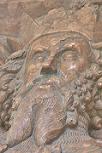


1406 Early in the year Henry Sinclair (St. Clair), 1st Earl of Orkney (1345-1407) (grandfather of Rosslyn Chapel builder William Sinclair, 3rd earl of Orkney) and Sir David Fleming of Biggar and Cumbernauld (-1406) back the cause of 11-y.-o. Scottish heir to the throne prince James Stewart (1394-1437) (later James I) against his younger brother Duke Robert of Albany and the 6th earl of Douglas in Lothian, but a force led by Sir James Douglas "the Gross" of Balvenie (Balveny) (1371-1443) (later 7th earl of Douglas) (2nd son of Archibald Douglas, 3rd earl of Douglas) defeats them, kills Fleming and causes Orkney and James to flee to Bass Rock in the Firth Estuary of the Forth River NE of Edinburgh (a prison island that is also home to the northern gannet), then board a German ship to France; too bad, on Mar. 22 after the duke of Albany tips them off, James is captured by English pirates, and handed over to Henry IV, who orders him held prisoner in the Round Tower in Windsor, where he remains for 18 years to insure the good behavior of the pesky Scots; on Apr. 4 his father king (since 1390) Robert III (b. 1337) of Scotland dies of grief in Rothesay Castle on the Isle of Bute in W Scotland, and leaves him the throne, with Duke Robert of Albany as regent of a caretaker govt. that acknowledges James as king but won't take his orders for fear that he is under English coercion; Bass Rock later becomes a religious retreat - William Wallace rolls over in his five or six graves? On July 15 William the Courteous (b. 1370) dies without heirs, and his three younger brothers agree to partition Inner Austria; the eldest Leopold IV (1371-1411), duke of Further Austria (1391-1402) and Tyrol (since 1396) gives up Tyrol in favor of duke of Further Austria (since 1402) Frederick IV Empty Pockets (1382-1439) (younger son of Leopold III), and holds guardianship over the youngest, Duke Albert V (1397-1439) (archduke of Austria since 1404); Ernest the Iron (1377-1424) becomes duke of Inner Austria (Styria, Carinthia, and Carniola) (until June 10, 1424), getting into a war with Leopold over Albert until May 1409, then becoming uncontested head of the Leopoldian Dynasty when Leopold dies without heir in 1411. On Sept. 16 Moscow metropolitan Cyprian (b. 1336) dies, leaving The Book of Degrees (completed in 1563), grouping Russian monarchs in the order of their generations, and is succeeded by Photius of Kiev (-1431) (a non-Russian speaker) as metropolitan of Moscow, and Isidore of Kiev (1385-1463) as metropolitan of Kiev and All Russia; in 1408 Cyprian's workshop pub. the Trinity Chronicle, glorifying Mosow as the rightful center of Russian Orthodox culture and the Third Rome (heir to Constantinople if/when it falls to the Turks). On Nov. 6 after deposing Ladislaus of Naples as king of Naples on June 18, Pope (since 1404) Innocent VII dies, and on Nov. 30 Angelo Corrario (Correr) is elected Pope (#204) Gregory XII (1327-1415); Raimondo Del Balzo Orsini leads a revolt against Ladislaus, but dies next Jan., after which his wife Mary of Enghlen (1367-1446) continues in his place, successfully defending Taranto against a 2-mo. siege next spring, after which Ladislaus signs a peace treaty with the pope next July, becoming protector of the Papal States, moving to Taranto and marrying her on Apr. 23, 1407. On Dec. 25 king (since Oct. 9, 1390) Henry III the Sufferer (b. 1379) dies in Toledo while preparing a campaign against Granada, and his infant son John (Juan) II (1405-54) becomes Trastamara king of Castile and Leon #4 (until July 20, 1454) under the regency of his mother Catherine of Lancaster (daughter of John of Gaunt) and his uncle Ferdinand I the Just of Aragon (1380-1416) after the latter declines the throne; his 48-year reign is the longest in the history of the Trastamara Dynasty; Castilian poet Inigo Lopez (Íńigo López) de Mendoza y de la Vega, Marquis of Santillana (1398-1450) goes on to thrive during John II's reign, adapting the humanism of Dante Alighieri (1265-1321), Petrarch (1304-74), and Giovanni Boccaccio (1313-75) to the stifling orthodox Roman Catholic atmosphere of Spain. Venice acquires Padua (until 1797), governing it with two Venetian nobles, one military and one civilian, with the Paduans getting to send a noble to Venice to speak for their interests. England's French territories are attacked by Duke Louis of Orleans. Ming Yung-lo sends messengers to Japan, and occupies Vietnam in an attempt to make it a Chinese province (until 1428). The advent of Nitai and Gaur, beginning the 5K-year Golden Age of this 432K-year Kali8yuga. Architecture: Gonzaga Fortress in Mantua, Italy (begun in 1395) is finished, complete with jaws-will-drop wall paintings by Andrea Mantegna. Art: The Cheng Hua (Chenghua) Period of Chinese Porcelain begins (ends 1487). Births: Hungarian count Ulrich II of Cilli (Celje) (Cillei) (d. 1456) in Cellje; son of Count Frederick II of Celje and Elizabeth Frankopan. Florentine painter Fra' Filippo (Lippo) Lippi (d. 1469) in Florence; father of painter Filippino Lippi (1457-1504). Italian "On Civic Life" humanist historian Matteo Palmieri (d. 1475) in Florence. Italian Renaissance painter Sano di Pietro (d. 1481). Deaths: Bulgarian monk Cyprian (b. 1330) on Sept. 16 in Moscow. Arab Muslim historian Ibn Khaldun (b. 1332) on Mar. 19 in Cairo, Egypt. Scottish king (1390-1406) Robert III (b. 1337) on Apr. 4 in Rothesay Castle on the Isle of Bute; buried in Paisley Abbey instead of Scone Abbey after he tells the queen that he should be buried in a midden (dungheap) with the epitaph: "Here lies the worst of kings and most wretched of men in the whole kingdom." Austrian duke William the Ambitious (b. 1370) on July 15 in Vienna. Spanish king (1390-1406) Henry III of Castile (b. 1379) on Dec. 25 in Toledo.



1407 The plague returns to London. On Nov. 23 after getting pissed-off at English Queen Isabelle suddenly deciding that blood is thicker than wine and switching to his enemy's side, and despite vowing to their joint uncle Duke John of Berry to reconcile, Duke John the Fearless of Burgundy fearlessly has Duke Louis of Orleans (b. 1372) assassinated on the streets of Paris, calling it a justifiable act of "tyrannicide", and after escaping Paris and fighting off the Orleans party becomes the hero of Paris, gaining control of the French govt., which precipitates the (well-wined?) Burgundian-Armagnac Civil War (ends Sept. 21, 1435) between the pro-English Burgundians (supported by the pop., the U. of Paris, and the Wittelsbachs, and strong in the N and NE) and the anti-English Armagnacs, headed by Bernard VII, Count of Armagnac (1360-1418), future father-in-law of Louis' teeny son and future successor Charles of Valois, Duke of Orleans (1394-1465) (future father of king Louis XII) (supported by the great French nobles, and strong in the S and SE); torn by factional rivalry, the French make a truce with Henry IV, depriving the Welsh of aid. Pissed-off Scotland attacks English garrisons in S Scotland and renews the Auld Alliance with France. Ladislaus of Naples take advantage of whimp Pope Gregory XII and invades the Papal States, conquering Ascoli Piceno and Fermo. China conquers Vietnam again for two decades (until 1428). Cheng Ho returns to China from his first voyage with the prince of Palembang (Sumatra) in chains. Duisburg joins the Hanseatic League. The Merchant Adventurers trading co. is incorporated in England (until 1808) to export cloth to the Netherlands, centered in Bruges; in 1446 it moves its trading center (staple) to Antwerp. Casa di San Giorgio one of the first known public banks is founded in Genoa (until 1805) - how long till the international Jewish bankers get control of everybody's money and take over the world? Italian humanist scholar Gasparinus (Gasparino) de Bergamo (da Barzizza) (Di Pietrobuono) (1360-1431) founds a school in Padua, where he lectures until 1421 on Roman authors incl. Cicero, Seneca, Terence, and Virgil, establishing an allied elementary school whose students incl. Vittorino da Feltre (Ramboldini) (1378-1446), Antonio Beccadelli "Il Panormita" (1394-1471), and Leon Battista Alberti (1404-72). Jopen brand beer is first brewed in Haarlem, Netherlands in modern-day Jopengasse St. Architecture: Work begins on the C tower of York Minster (finished 1423). Bethlehem Hospital (Bedlam) in London becomes a warehouse for the insane. Births: Italian Renaissance humanist scholar-priest (Roman Catholic) Lorenzo Valla (d. 1457) in Rome; student of Johannes Bessarion (1395-1472); exposer of the medieval forgery of the Donation of Constantine. Turkish Sunni Muslim scholar-poet-judge (1st qadi of Istanbul) Khidr Bey (Beg) (d. 1459 (d. 1456?) in Sivrihisar. Deaths: Spanish statesman-writer Don Pero Lopez de Ayala (b. 1332) in Calahorra. English lord Thomas Beauchamp, earl of Warwick (b. 1339). French duke (1392-1407) Louis I of Orleans (b. 1372) on Nov. 23 in Le Marais, Paris (assassinated by 15 masked assassins on orders of Duke John the Fearless of Burgundy).
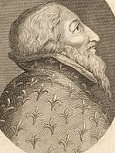

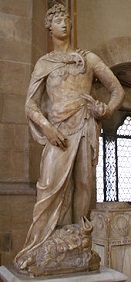

1408 On Feb. 20 Harry Hotspur's father Henry Percy, 1st Earl of Northumberland (b. 1341), warden of the marches (marshal of England), who had invaded England from the N in the expectation of recruiting followers to overthrow Henry IV is defeated and KIA at the Battle of Bramham Moor in Yorkshire by the local levy when he fails to attract enough locals to his cause. On Apr. 25 after sieging Ostia to counter the French party backing Antipope Benedict XIII, and capturing it after bribing papal cmdr. Paolo Orsini, Ladislaus of Naples enters Rome, later capturing Perugia. The U. of Prague is torn apart by the Great Schism after Wenceslaus IV the Drunkard, fearing that Roman pope Gregory XII might interfere in his plans to be crowned HRE orders his prelates and the univ. faculty to maintain strict neutrality between him and Avignon pope Benedict XIII, after which Prague archbishop (1403-11) Zbynek Zajic of Hasenburg (1376-1411) tells him to stuff it and remains faithful to Gregory XII, while Bohemian preacher Jan Hus (1369-1415), leader of the "Czech nation" avows neutrality; too bad, Hus gets into trouble for railing against Church moose hockey such as indulgences, and is defrocked, but the pop. rises to support him; meanwhile a convocation is held in Lucca, Italy to end the Great Schism - this bud's for you, Lucca? Church-approved Dominican missionary (St.) Vicente Ferrer (1350-1419) begins a preaching work (ends 1416) to mass-convert the benighted Jews and Muslims in Spain and Granada, and tens of thousands fall for it; meanwhile in Granada Yusuf III is ordered killed by his brother king Muhammad VII (1370-1408), but is granted his last request of finishing a chess game first, and the monarch dies before the game is finished, allowing him to survive and become sultan Yusuf III (-1417) (until 1417) - the original Bobby Fischer? Cheng Ho embarks on his Second Voyage from China to Ceylon (ends 1412); the Chinese occupy Sri Lanka (Ceylon) (ends 1438). HRE Sigismund I and his 2nd wife Barbara Cilli found the Order of the Dragon for Christian knights opposing the Turks, modeled on the Order of St. George of Hungary, with a logo of a defeated dragon symbolizing defeated heresy. Art: Donatello (1386-1466), Clothed Statue of David (marble sculpture) (1408-9); commissioned to be mounted on top of Florence Cathedral, it proves to small to be seen from the ground, and is taken back to the workshop until 1416, when it is mounted in Palazzo della Signoria; St. John (sculpture) (1408-15). Births: Polish princess Jadwiga of Lithuania (d. 1431) on Apr. 8; daughter of Wladyslaw II Jagiello (1351-1424) and 2nd wife Anna of Celje (1380-1416). Indian mystic saint-composer Sri Tallapaka Annamacharya (d. 1503). Deaths: Korean king #1 (1400-8) Taejo (b. 1335) on May 24 in Changdeok Palace. English lord Henry Percy, 1st earl of Northumberland (b. 1342) on Feb. 20 in Bramham Moore, Yorkshire (KIA).
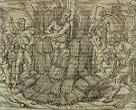

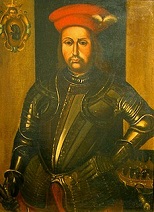


1409 On Jan. 18 after Jan Hus' preaching at the U. of Prague causes an uproar among the Germans in the faculty and student body, causing the Hussites to send Jerome of Prague (1379-1416) to Wenceslaus IV to ask him to change the constitution of the univ., and Poland, Bavaria, and Saxony oppose the the emperor's request to remain neutral between the two rival popes of the Great Schism, Wenceslaus IV issues the Decree of Kutna (Kutná) Hora (Kuttenberg), giving the Czech nation three votes in the elections to the faculty of Prague U. and the other three only one vote each, after which Hus is voted rector of Prague U., causing deposed rector Johannes of Munsterberg and 5K-25K students and profs. to leap and zigzag out and found Leipzig U. in Saxony, which is backed by a bull issued by new Antipope Alexander V on Sept. 9, and later becomes the alma mater of superbrain Gottfried Wilhelm von Leibniz. On Mar. 25 the cardinals of Rome and Avignon meet in the Council of Pisa, called by Rupert III to end the 30-year Great Schism, and depose Roman Pope Gregory XII and Avignon Antipope Benedict XIII, then on June 26 elect compromise candidate Pietro Phillarges (Peter of Candia) as antipope #3 of the Great Schism Antipope Alexander V (1339-1410) (until May 3, 1410); from this year to 1417 there are not one, not two, but three popes, G12, B13, and A5 (sounds like an interesting chess game); Wenceslaus IV and the Hussites approve of the election, but Prague archbishop Zbynek Zjic remains loyal to Gregory XII, and though he had initially supported Jan Hus, he suddenly turns on him and orders him to discontinue preaching from his pulpit at Bethlehem Chapel in Prague, then after Wenceslaus IV pressures him to accept Alexander V, he gets him to condemn Hus in a papal bull on Dec. 20 in exchange for supporting him as da one and only pope. On June 30 the Battle of Sanluri (San Luigi) in Sardinia is a V for Martin the Younger of Sicily over the Sardinians, leading to the loss of independence for pesky Arborea, and recovery of the island by Aragon. On Aug. 14 Teutonic Knights grandmaster (1407-10) Ulrich von Jungingen (1360-1410) declares war on the Polish-Lithuanian state, but offers an armistice from Oct. 8 to June 24, 1410; he dies on July 15, 1410 while trying to attack Vytautas the Great of Lithuania. Edmund de Mortimer, 3rd earl of March dies after being sieged by royal forces under Harry of Monmouth, prince of Wales (future Henry V) in Harlech in Wales; Owen Glendower flees to the Cambrian Mts. - where he always keeps a lucky trilobite in his pocket, or is he just happy to see me? Henry IV finally solidifies his reign at the cost of a physical breakdown; Prince Henry of England begins to work actively in the privy council. In late July after Sienna and Florence along with Cardinal Baldassare Cossa ally against him, and Antipope Alexander V excommunicates him, Louis II of Anjou conquers Naples from Ladislaus of Naples and takes the Neopolitan crown, after which the allies send an army to invade the papal lands under Ladislaus' control and siege Rome, after which papal cmdr. Paolo Orsini defects with 2K men, and the allies go on to capture the Vatican and the Trastevere quarter, while Cardinal Cossa goes to N Italy to obtain more support; meanwhile Venice recovers its territories on the Dalmatian coast after Ladislaus sells the rights for 100K ducats in an attempt to gain their help in his upcoming war against the Repub. of Florence caused by his alliance with their enemy Lord Paolo Guinigi of Lucca, invading Tuscany and capturing Cortona and Elba Island from Gherardo Appiani, after which Florence hires condottiero Braccio da Montone (Andrea Fortebracci) (1368-1424) AKA Braccio Fortebraccio, who defeats Ladislaus and forces him to retreat. Eric of Pomerania forces the German nobles to surrender Flensburg in S Schleswig, but they regroup and try to get it back. Architecture: Ganden Monastery, the first Gelugpa (Gelukpa) (yellow hat) monastery is founded in Tibet by Tsongkhapa; the first Great Prayer Festival is held in Lhasa. Tartar City (Nei Cheng), a square enclosure on the N end inside walled moated Peking is begun (finished 1420), complete with a 15-mi. 40-ft.-high brick-faced earth-concrete wall with nine gates. Gothic-style Hunyad Castle is given to Vajk by Sigismund of Luxemburg, going on to survive to modern times as a tourist attraction. Births: French knight-lover duke of Anjou (1434-80), duke of Lorraine (1431-53), king of Naples and Sicily (1438-42), king of Jerusalem (1438-80), king of Aragon, Valencia, Majorca, and Sardinia (1466-80), Count of Bar, Provence, Piedmont, Guise, and Calabria, king of Hungary "Good King" Rene I of Anjou (d'Anjou) (d. 1480) on Jan. 16 in Angers Castle; 2nd son of Duke Louis II of Anjou (1377-1417) and Yolande of Aragon (1384-1442); father of Iolande de Bar (1428-83) and Margaret of Anjou (1429-82); one of the most powerful men in 15th cent. Europe. Hungarian-Bohemian-German queen Elisabeth (Elizabeth) of Luxembourg (Bohemia) (d. 1442) on Oct. 7 in Visegrad, Hungary; only daughter of HRE Sigismund I (1368-1437) and 2nd wife Barbara of Celje (1390-1451); paternal granddaughter of HRE Charles IV and Elisabeth of Pomerania; wife of HRE Albert II; mother of Ladislaus V Posthumous (1440-57), Duchess Anna of Thuringia (1432-62) and Elisabeth of Poland (1437-1505). Burmese Hanthawaddy king #16 (1471-92) Dhammazedi (d. 1492) in Nov.-Dec.